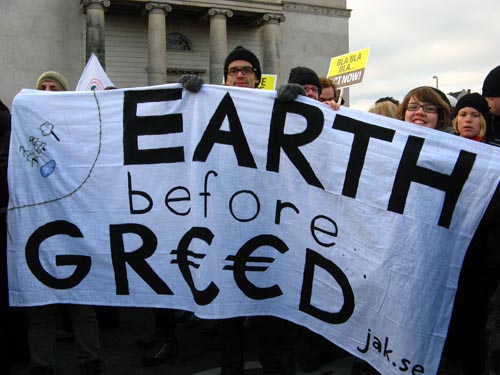By Neil Leary
Bill McKibben, in his role as a ‘professional bummer-outer’, began his public lecture at Dickinson College by first speaking about the bad stuff, “the valley” – what we are doing to the atmosphere, the climate and the oceans, the changes they are making in the world around us, and the risks those changes are creating. He began this way because, as he said, “Unless we understand the pace and scale of the problem that we face, we have no way of understanding the pace and scale of the solutions that are required.”
McKibben then moved on to talk about what he has done and is doing personally, with students, with 350.org, and with others to bring attention to climate change. To make it politically untenable for elected officials to ignore climate change and continue to take no action. To make it socially unacceptable to profit from the extraction and burning of fossil energy.
He also spoke to us about our responsibilities for action. Responsibilities as individuals, as students, faculty and employees of a college, and the responsibilities of institutions such as Dickinson. His words give us much to think about. We are already engaged as an institution in acting on climate change. We teach about climate change, its causes, its consequences and strategies for limiting climate change and its negative impacts. We provide our students, and other members of the Dickinson community, with sills and encouragement to be active, engaged citizens. We are, as a signatory of the American College and University President’s Climate Commitment, working to reduce greenhouse gas emissions that are generated in operating our campus.
But we are also invested in corporations in the fossil energy sector. What will we do about this? What should we do? Dialogue on these questions began at Dickinson before McKibben’s visit, and his visit has energized and inspired many who are engaged in the dialogue.
Much of what McKibben said that evening is familiar to me, having spent much of the past 20 years working on climate change. But one thing he said was new to me and gave me a different framing for thinking about the problem: there’s nothing radical about advocating to limit CO2 in the atmosphere to 350 ppm; radical is making money from fossil energy. Here’s what he said:
“There is nothing, and I mean nothing, radical about anything that I’ve been saying. All we are asking for is a world that works like the world we were born into, and that every human being for 10,000 years has been born into. That’s not radical by any reasonable definition. That’s a conservative request that we are making.
Radicals work at oil companies. If you are willing to get up in the morning and go to work making a fortune by altering the chemical composition of the atmosphere, when science has told you what it will do, once you’ve seen by watching the melting artic what it will do, if you are willing to do that, then you are engaged in a more radical act than any human being who has come before you.”
McKibben went on to say: “And, if you’re willing to hold stock in that company, then you are, at least, a kind of participant in that radicalism. Our job is to check that radicalism.”
Through the investments of Dickinson’s endowment, we are a participant in the radicalism of filling the atmosphere with greenhouse gases and changing the planet. I am of mixed minds about what to do about this. Divestment would end our participation in making profit from fossil energy. But we would still be implicated through our consumption of fossil energy, and through our use of resources that were produced and delivered to us with fossil energy. For me, the priority is moving our entire society to reduce quickly and deeply our emissions of greenhouse gases by conserving energy and other resources, improving energy efficiency and transitioning away from fossil energy sources. Will participation in the divestment movement help bring that change? That’s an important and but open question.

